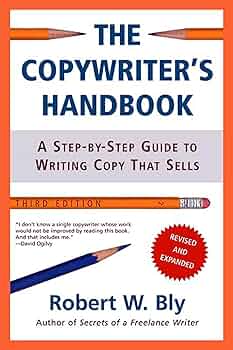Excerpts from The Bible of Good Writing (Copywriters Handbook by Robert W Bly) – Brand Managers 64

Use Short Sentences
Rudolf Flesch, best known for his books Why Johnny Can’t Read and The Art of Plain Talk, says the best average sentence length for business writing is 12 to 16 words.
16 to 20 words is passable, he adds, but above 20 words, the writing becomes unreadable.
Business writers place a premium on clarity. Hence their sentences are even shorter than Flesch’s recommended average.
The average sentence length in hundreds of other business-writing I measured ranges from 6 to 16 words. The average sentence length of your copy should also fall in this range.
Now, let’s take a look at how you can reduce sentence length.
First, you should break large sentences into two or more separate sentences.
Another method of breaking a long sentence is to use punctuation to divide it into two parts.
Copy becomes dull when all sentences are the same length.
To make your writing flow, vary sentence length. By writing an occasional short sentence or sentence fragment, you can reduce the average sentence length of your copy to an acceptable length even if you frequently use lengthy sentences.
Train yourself to write in crisp, short sentences. When you have finished a thought, stop! Start the next sentence with a new thought. When you edit, your pencil should automatically seek out places where a long string of words can be broken in two.
Paragraphs should also be kept short
Paragraphs should also be kept short. Long, unbroken chunks of type intimidate readers, a page filled with a solid column of tiny type says, “This is going to be tough to read!”
When you edit your copy, use subheads to to separate major sections. Leave space between paragraphs. And break long paragraphs into short paragraphs. A paragraph of five sentences can usually be broken into two or three shorter paragraphs by finding places where where a new thought or idea is introduced. Begin the paragraph with that thought.
Use Simple Words
Simple words communicate more effectively than big words. People use big words to impress others, but they rarely do. More often, big words annoy and distract the reader from what the writer is trying to say.
Yet big words persist, because using pompous language makes the reader or speaker feel important.
What do you think of this sentence?
In an article appearing in Defense News, a publication of the Westinghouse Defence Center, a manager tells his staff: “I want you to focalize on your optionalizations, prioritize your parametrics, budgetize your expendables, and then schedualize your throughput.”
Fred Danzig, writing in Advertising Age, asks why an E. F. Hutton executive says the market might “whipsaw back and forth” when he could have said it “will go up and down.”
In advertising copy, you are trying to communicate with people, not impress them or boost your own ego. Avoid pompous words and fancy phrases.
Cecil Hoge, the mail-order expert, says the words in your copy should be “like the windows in a storefront. The reader should be able to see right through them and see the product.”